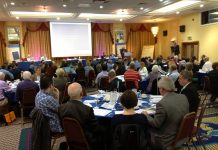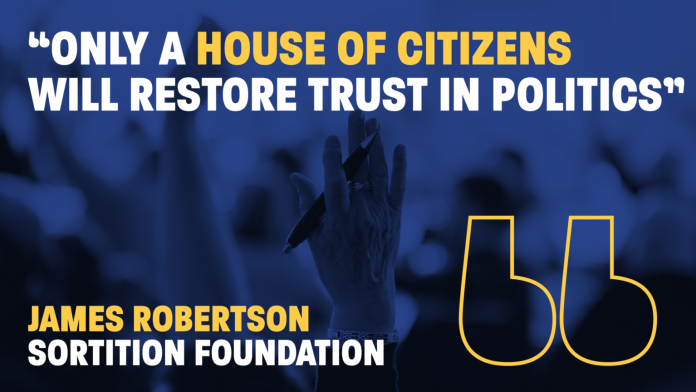Trust in politics in the UK is its lowest since records began (Quilter-Pinner & Statham,
2021). This is not surprising given how untrustworthy the UK’s current political
institutions are. They don’t trust the people, and the people don’t trust them back.
The starkest symbol of this deficit of trust is the House of Lords. Despite occasional
worthwhile contributions, it remains an exclusive inaccessible club.
This is not a new concern. Attempts at reform over more than a century have failed time
and again leaving the Lords stubbornly at the heart of the UK’s constitution, playing a
central role in writing and passing the laws which affect everyone in the UK.
A second chamber for all
The UK benefits from a second chamber that checks and balances the House of
Commons, and the public wants more accountability and scrutiny of politicians, not
less. But this constitutional hangover from our feudal past is not the way.
It’s time to recognise the obvious solution – trust the people. Juries of ordinary people
with meaningful legal powers were first codified into English law over 850 years ago in
- Citizens have been entrusted with this crucial civic duty for centuries now and the
jury is one of the few governing institutions to have retained the respect and trust of the
people. In contrast to the House of Commons, it remains deeply respected and valued.
Research by the Sortition Foundation and others clearly shows that UK citizens
overwhelmingly trust each other more than politicians (see Figure 1 – p5 and Figure
3 – p10). So, let’s replace the House of Lords with a House of Citizens—a permanent,
powerful assembly. It’s time to put power where trust lies: in the hands of the UK
citizens.
A House both of and for UK citizens
Inspired by the existing permanent assemblies in Paris and East Belgium, a UK House
of Citizens would be a second chamber made up of between 325 and 450 people who
reflect the broad makeup of our country. So, for example, half the decision makers
would be women and it would guarantee representation to young people, people
of colour, disabled people and those living the length and breadth of the country in
proportion to their share of the UK population.
Unlike the Lords, where most have had a career in politics, a House of Citizens would
comprise people from all walks of life: tradespeople, carers, shopkeepers, nurses,
doctors, lawyers, writers, teachers, business people and the countless other roles
people have today. They would be paid the same as MPs and, if they’re willing and
able, serve in the House of Citizens for up to two years before returning to work, just as
people do after taking parental leave.
This House of Citizens would hold politicians to account and ensure that new laws are
sensible and fair and have community support. Even with a membership half the size
of the current House of Lords, the House of Citizens would have sufficient members to
create smaller, representative sub- assemblies in order to scrutinise multiple pieces of
legislation at once. As well as listening to a range of legal and policy expertise, members
of the House of Citizens would also hear from those on the front line of any specific
issue to inform their deliberations.

















